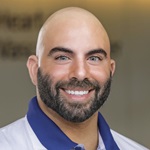Does Binge-Watching Do 'Stranger Things' to Your Brain

Find Your Perfect Match
Answer a few questions and we'll provide you with a list of primary care providers that best fit your needs.
You can’t wait to watch the entire second season of “Stranger Things” on your next free weekend. The instant gratification of immersing yourself in the science fiction thriller will be enormous. But does your brain — or your emotions — pay a price?
Premier Health Now asked neuropsychologist Fadi Tayim, PhD, Premier Neuroscience Institute, to weigh in on the recent NBC News story exploring the perks and perils of binge-watching a TV series.
“Whether you’re binge-watching a horror show or a comedy, it’s like taking a mental vacation — a long break from reality,” Dr. Tayim says, admitting that he has been binge-watching TV series for years, including “Stranger Things.”
“During a pleasurable experience, the brain produces the neurotransmitter dopamine,” Dr. Tayim explains. “It convinces you to keep doing what you’re doing. But eventually, you’ll have dopamine depletion, causing lethargy or even depression. You grieve the end of a series as a loss.”
He notes that 90 percent of us get over it and go on with our lives. Some, however, take time to readjust to being outside the show or develop a craving for watching, similar to a physical addiction.
Dr. Tayim advises limiting your binge-watching if it’s interfering with other aspects of your life:
- Work or school performance declines because you can’t focus or aren’t getting enough sleep.
- You cancel plans with friends so you can stay home and watch a series.
- You have insomnia or increased anxiety.
- You’ve abandoned basic functions like bathing, cooking or cleaning.
“Binge-watching is a phenomenon of our on-demand culture,” Dr. Tayim says. “I like that we can watch an entire series, but we need limits. Unlike having a chemical addiction, you can find a substitute to occupy your time and feel good. Watch the show with friends to make it social. Then go shopping, go out to eat or exercise.”
Find Your Perfect Match
Answer a few questions and we'll provide you with a list of primary care providers that best fit your needs.
Source: Fadi Tayim, PhD, neuroscientist and Division Chief of Neuropsychology, Premier Health Clinical Neuroscience Institute; NBC News





